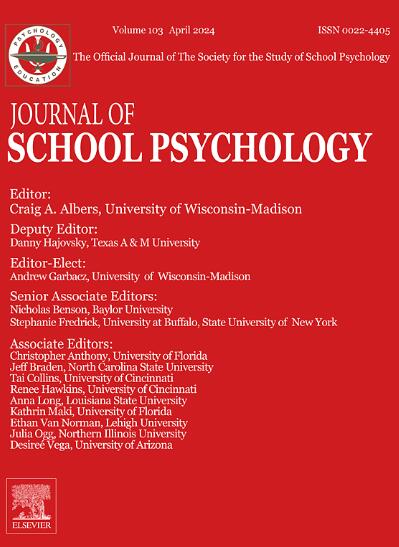Bystanders tend to defend victims in a supportive classroom climate: A cluster randomized control trial and an observational study
IF 4.1
1区 心理学
Q1 PSYCHOLOGY, SOCIAL
引用次数: 0
Abstract
When bystanders reinforce bullies, bullying tends to escalate; when bystanders defend victims, bullying tends to de-escalate. Recognizing this pattern, we adopted a social-ecological perspective within a self-determination theory framework to conduct two studies. Study 1 was a pre-registered cluster randomized control trial in which 38 Korean secondary teachers (9 females, 29 males; 19 experimental, 19 control) participated in an intervention to learn how to teach in highly autonomy-supportive and not-at-all controlling ways. We hypothesized that this approach to teaching would create a supportive peer-to-peer classroom climate, which in turn would increase defending- and decrease passive- and reinforcing-bystanding. In three waves over an academic year, 1084 adolescent students (490 females, 594 males) reported their classroom climate and bystanding behaviors. According to a doubly latent multilevel SEM analysis, experimental group teachers created a more supportive climate (Β = 0.55, p < .001) and this classroom-level effect increased defending-bystanding (Β = 0.55, p = .001), decreased passive-bystanding (Β = −0.52, p < .001), and decreased reinforcing-bystanding (Β = −0.40, p = .006). Study 2 was a correlational study in which 629 adolescent students (398 females, 231 males) reported on their teacher's autonomy-supportive and controlling motivating styles and the 11 teachers (four females, seven males) rated each student on the three bystanding behaviors and the extent to which they contributed to two dimensions of classroom climate (i.e., supportive and conflictual). A SEM analysis showed that students' perceived autonomy-supportive teaching predicted teacher-rated supportive climate (Β = 0.23, p = .036) and students' perceived controlling teaching predicted teacher-rated conflictual climate (Β = 0.11, p = .041). According to mediation analyses, supportive climate ratings then predicted teacher-rated high defending (Β = 0.28, p = .006) and low passive (Β = −0.29, p < .001) bystander behavior, whereas conflictual climate ratings predicted teacher-rated low defending (Β = −0.22, p = .008) and high passive (Β = 0.26, p = .001) and high reinforcing (Β = 0.37, p < .001) bystander behavior. We conclude that teachers can learn how to create a supportive climate that orients students toward defending and away from passive and reinforcing bystanding.
旁观者倾向于在一个支持性的课堂环境中保护受害者:一项集群随机对照试验和一项观察研究
当旁观者加强欺凌时,欺凌倾向于升级;当旁观者为受害者辩护时,欺凌倾向于降级。认识到这一模式,我们在自决理论框架内采用社会生态学视角进行了两项研究。研究1是一项预先注册的集群随机对照试验,其中38名韩国中学教师(9名女性,29名男性;(19名实验学生,19名对照组学生)参加了一项干预活动,学习如何以高度自主支持和完全不受控制的方式教学。我们假设这种教学方法会创造一种支持性的点对点课堂氛围,这反过来会增加防御,减少被动和强化的旁观。在一学年的三次浪潮中,1084名青少年学生(490名女生,594名男生)报告了他们的课堂气氛和旁观行为。双潜多层扫描电镜分析显示,实验组教师创造了更支持性的氛围(Β = 0.55, p <;.001),这种课堂层面的效应增加了防守性旁观(Β = 0.55, p = .001),减少了被动旁观(Β = - 0.52, p <;.001),而静置强化减少(Β = - 0.40, p = .006)。研究2是一项相关研究,629名青少年学生(398名女性,231名男性)报告了他们的老师的自主支持和控制激励风格,11名教师(4名女性,7名男性)对每个学生的三种旁观行为及其对课堂气氛两个维度(即支持性和冲突性)的贡献程度进行了评分。SEM分析显示,学生感知的自主支持性教学能预测教师评价的支持性气氛(Β = 0.23, p = 0.036),学生感知的控制性教学能预测教师评价的冲突气氛(Β = 0.11, p = 0.041)。根据中介分析,支持性气候评分预测教师评价的高防御(Β = 0.28, p = 0.006)和低被动(Β = - 0.29, p <;.001)旁观者行为,而冲突气候评分预测教师评价的低防御(Β = - 0.22, p = .008)、高被动(Β = 0.26, p = .001)和高强化(Β = 0.37, p <;.001)旁观者行为。我们的结论是,教师可以学习如何创造一种支持性的氛围,引导学生远离被动和强化旁观。
本文章由计算机程序翻译,如有差异,请以英文原文为准。
求助全文
约1分钟内获得全文
求助全文
来源期刊

Journal of School Psychology
PSYCHOLOGY, EDUCATIONAL-
CiteScore
6.70
自引率
8.00%
发文量
71
期刊介绍:
The Journal of School Psychology publishes original empirical articles and critical reviews of the literature on research and practices relevant to psychological and behavioral processes in school settings. JSP presents research on intervention mechanisms and approaches; schooling effects on the development of social, cognitive, mental-health, and achievement-related outcomes; assessment; and consultation. Submissions from a variety of disciplines are encouraged. All manuscripts are read by the Editor and one or more editorial consultants with the intent of providing appropriate and constructive written reviews.
 求助内容:
求助内容: 应助结果提醒方式:
应助结果提醒方式:


